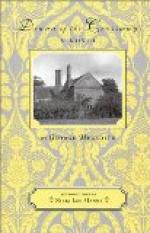‘I have not laughed so much since you were married,’ said Emma.
‘Nor I, dear; proving that the bar to it was the ceremony,’ said Diana.
She promised to remain at Copsley three days. ’Then for the campaign in Mr. Redworth’s metropolis. I wonder whether I may ask him to get me lodgings: a sitting-room and two bedrooms. The Crossways has a board up for letting. I should prefer to be my own tenant; only it would give me a hundred pounds more to get a substitute’s money. I should like to be at work writing instantly. Ink is my opium, and the pen my nigger, and he must dig up gold for me. It is written. Danvers, you can make ready to dress me when I ring.’
Emma helped the beautiful woman to her dressing-gown and the step from her bed. She had her thoughts, and went down to Redworth at the breakfast-table, marvelling that any husband other than a madman could cast such a jewel away. The material loveliness eclipses intellectual qualities in such reflections.
‘He must be mad,’ she said, compelled to disburden herself in a congenial atmosphere; which, however, she infrigidated by her overflow of exclamatory wonderment—a curtain that shook voluminous folds, luring Redworth to dreams of the treasure forfeited. He became rigidly practical.
’Provision will have to be made for her. Lukin must see Mr. Warwick. She will do wisely to stay with friends in town, mix in company. Women are the best allies for such cases. Who are her solicitors?’
‘They are mine: Braddock, Thorpe, and Simnel.’
’A good firm. She is in safe hands with them. I dare say they may come to an arrangement.’
‘I should wish it. She will never consent.’
Redworth shrugged. A woman’s ‘never’ fell far short of outstripping the sturdy pedestrian Time, to his mind.
Diana saw him drive off to catch the coach in the valley, regulated to meet the train, and much though she liked him, she was not sorry that he had gone. She felt the better clad for it. She would have rejoiced to witness the departure on wings of all her friends, except Emma, to whom her coldness overnight had bound her anew warmly in contrition. And yet her friends were well-beloved by her; but her emotions were distraught.
Emma told her that Mr. Redworth had undertaken to hire a suite of convenient rooms, and to these she looked forward, the nest among strangers, where she could begin to write, earning bread: an idea that, with the pride of independence, conjured the pleasant morning smell of a bakery about her.
She passed three peaceable days at Copsley, at war only with the luxury of the house. On the fourth, a letter to Lady Dunstane from Redworth gave the address of the best lodgings he could find, and Diana started for London.




